DUBAI: Some of the Middle East’s leading ladies made an appearance at the first-ever edition of the Manarat film festival in Tunisia this week, including Egypt-based actress Hend Sabri, Jordanian starlet Saba Mubarak and Tunis-born Dorra Zarrouk.
The film festival, which translates to mean “light house” in English, kicked off Tuesday with a screening of Gianfranco Rosi’s Oscar-nominated “Fuocoammare” and is set to run until July 15.
The 2016 film centers on the Italian island of Lampedusa, whose inhabitants are left shaken when waves of migrants land upon its shores.
Organizers delayed the official opening ceremony after eight members of Tunisia’s security forces were killed Sunday in a “terrorist attack” near the border with Algeria, the interior ministry said, the country’s deadliest such incident in over two years.
“In view of the painful events … (the ceremony) has been postponed until Tuesday, July 10.
May God bless our righteous martyrs,” a post on the festival’s official Facebook page read.
Presiding over the event is Tunisia’s first female film producer, Dora Bouchoucha, who also helmed Tunisia’s Carthage Film Festival in 2008, 2010 and 2014.
In 2017, the Huffington Post called her “a born rebel, a trailblazer of wonderful self-assurance, elegance and beauty” and in 2018, she proved that she still has a lot to offer by attending the Cannes Film Festival premiere of the feature film her company, Nomadis Images, co-produced, “Weldi,” or “Dear Son” in English.
The festival aims to strengthen the relationship between Tunisia and countries in the Mediterranean Basin. To that end, organizers are putting on a show of more than 50 films, including movies from Egypt, Algeria, Italy and Bosnia and Herzegovina, among various other countries.
Highlights include “Ghost Hunting,” a 2017 film by director Raed Andoni, and 2017’s “The Man Behind the Microphone,” which tells the story of Hedi Jouini, the so-called godfather of Tunisian music.
The festival will also feature a competition section that will see such films as “The Blessed,” an Algerian offering directed by Sofia Djama, and “A Ciambra,” directed by Itay’s Jonas Carpignano, go head to head for the top prize. The judging panel includes Lebanese actress Manel Issa, Egyptian actress Bushra Rozza and Palestinian actress Manal Awad.
Cinephiles can also enjoy a host of films that are set to be broadcast on public beaches, including La Goulette, La Marsa and Hammam-Lif among others.
For her part, Sabri set to be honored for one of her first-ever movies, 1994 drama “Samt El-Qusur” — “The Silences of the Palace” in English — and Rozza will get a nod from the organizers for her film on sexual harassment, “678.”
Six films to watch at the festival
Tunisia’s Manarat festival is set to run until July 15 and is showing 52 films from across the Arab world and beyond. Here, we take a look at some of the thought-provoking movies that will entertain audiences over the next few days.
‘Withered Green’
Directed by Mohamed Hammad, this Egyptian film tells the story of a defining week in protagonist Iman’s life as she attempts to convince her uncles to attend her younger sister’s engagement. However, a shocking discovery leads her to do away with such traditions. The film, which premiered in 2016, won the Muhr Feature Award for Best Director at the Dubai International Film Festival.
‘Ghost Hunting’
Director Raed Andoni placed a newspaper advert in Ramallah looking for former inmates of Jerusalem’s Moskobiya interrogation center in this 2017 film. The director then oversaw the creation of a replica of the interrogation facility using the memories of the former inmates and filmed the process, as well as interviews with the men.
‘Paradise Now’
This hard-hitting movie tells the story of two childhood friends who are recruited for a suicide bombing in Tel Aviv. Directed by Hany Abu-Assad and released in 2005, the film was nominated for the Best Foreign Language Film of the Year at the 2006 Academy Awards, but narrowly missed out. It did, however, win a Golden Globe in the same year.
‘The Man Behind the Microphone’
The 2017 film is a portrait of Hedi Jouini, the so-called godfather of Tunisian music. Directed by Claire Belhassine, it tells the tale of his rise to stardom, as well as his family life.
‘Men Don’t Cry’
Directed by Alen Drljevic, this 2017 film plays out in a boarded up Serbian hotel that plays host to a group of veterans undergoing therapy almost 20 years after the end of the Yugoslav Wars. The complexities of the period of hostility are explored through the men and their tangled relationships with one another as they try to battle their sense of shame years after the end of the violent conflict.
‘Laila’s Birthday’
Starring Mohammad Bakri, Areen Omari and Nour Zoubi and directed by Rashid Masharawi, this film tells the story of Abu Laila who finds himself driving a taxi to make ends meet. On his daughter’s seventh birthday, he tasks himself with finding her a cake, but the chaos of daily life in Palestine hampers his plans.
Leading ladies touch down in Tunisia for new Manarat film festival
Leading ladies touch down in Tunisia for new Manarat film festival
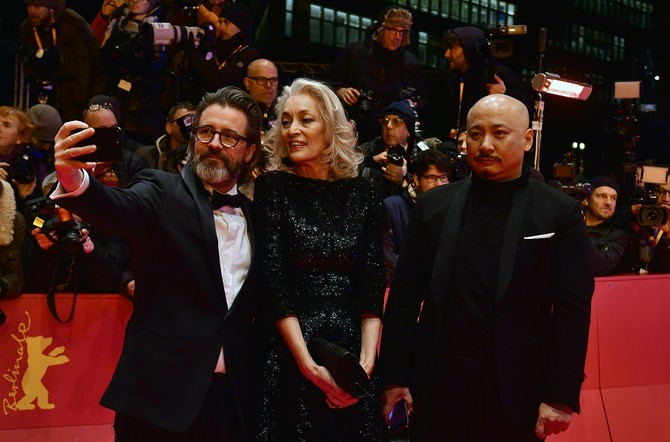
Moroccan director Asmae El-Moudir joins Cannes’ Un Certain Regard jury
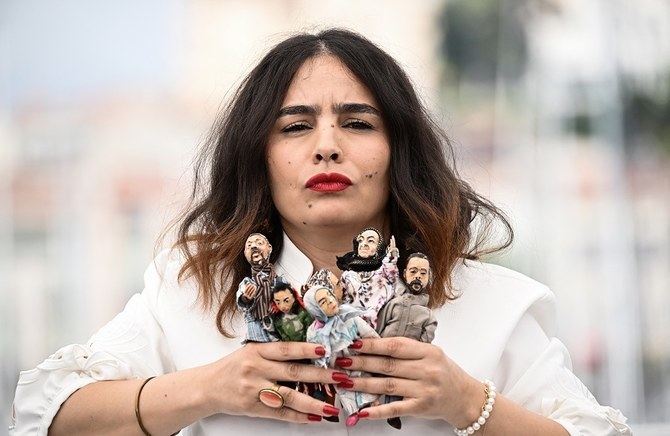
DUBAI: The Cannes Film Festival announced on Thursday that Moroccan director, screenwriter and producer Asmae El-Moudir will be part of the Un Certain Regard jury at the 77th edition of the event, set to take place from May 14-25.
She will be joined by French Senegalese screenwriter and director Maïmouna Doucouré, German Luxembourg actress Vicky Krieps and American film critic, director, and writer Todd McCarthy.
Xavier Dolan will be the president of the Un Certain Regard jury.
The team will oversee the awarding of prizes for the Un Certain Regard section, which highlights art and discovery films by emerging auteurs, from a selection of 18 works, including eight debut films.
El-Moudir is the director of the critically acclaimed film “The Mother of All Lies.”
The movie took the honors in the Un Certain Regard section, as well as winning the prestigious L’oeil d’Or prize for best documentary at the festival in 2023. The film explores El-Moudir’s personal journey, unraveling the mysteries of her family’s history against the backdrop of the 1981 bread riots in Casablanca.
El-Moudir is not the only Arab joining the Cannes team.
Moroccan Belgian actress Lubna Azabal this week was appointed the president of the Short Film and La Cinef Jury of the festival. The La Cinef prizes are the festival’s selection dedicated to film schools.
Second Ritz-Carlton Reserve in Saudi Arabia planned for Neom
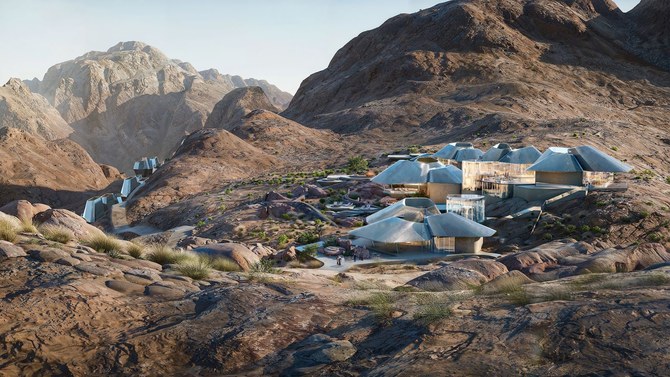
DUBAI: Marriott International, Inc. announced on Thursday that it has signed an agreement with Neom to open its second Ritz-Carlton Reserve in Saudi Arabia.
The hotel is anticipated to open in Trojena, a year-round mountain destination located in the northwest region of the country.
The resort is expected to feature 60 expansive one-to-four-bedroom villas. Plans also include a range of amenities including a spa, swimming pools and multiple culinary venues.
Chadi Hauch, the regional vice president of Lodging Development Middle East, Marriott International said in a statement: “Together with Neom, we look forward to bringing this ultra-luxury experience to Trojena. This signing also marks an important addition to our portfolio in Saudi Arabia where we continue to see a strong demand for our luxury brands.”
“Trojena is a rare destination, and we are delighted that Ritz-Carlton Reserve has hand-picked the mountains of Neom for their next property. Together we will create an experience that can’t be recreated anywhere else. Our visitors and residents will experience a sanctuary that will capture the magic of Saudi Arabia, embracing ultimate luxury in an unforgettable location,” executive director and Trojena region head Philip Gullett said in a statement.
Trojena, one of the flagship developments within Neom, is being developed and positioned as a year-round adventure sports destination that will include activities such as skiing, water sports, hiking and mountain biking. It will also include apartments, chalets, retail, dining, entertainment, leisure, sports and recreational facilities, and other hospitality offerings, including a W Hotel and a JW Marriott Hotel.
Ritz-Carlton Reserve currently boasts a collection of only six properties in destinations including Thailand, Indonesia, Puerto Rico and Mexico.
The Arab world at the Venice Biennale: Artists explore themes of identity, immigration, history
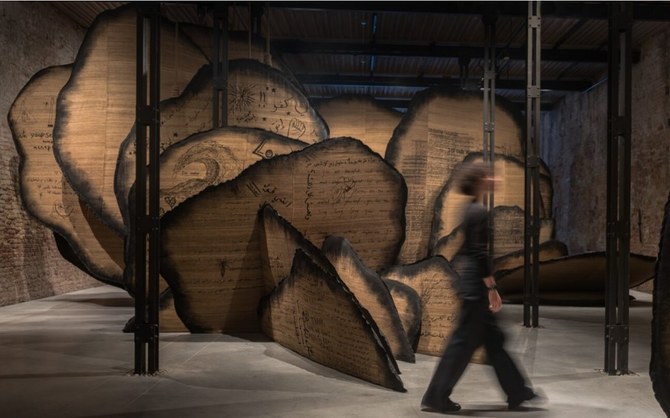
VENICE: No event in the international art scene is more anticipated, or debated, than the Venice Biennale. This year’s edition, “Foreigners Everywhere,” curated by Adriano Pedroso from Brazil, features 331 artists and 86 nations, including four Gulf countries as well as Lebanon and Egypt.
Saudi Arabia
Women’s voices chanting in unison fill the air of the Saudi Pavilion at Venice this year. “Shifting Sands: A Battle Song” was created by Saudi artist Manal AlDowayan, and hundreds of women from across the Kingdom participated in its creation. The exhibition, which includes large-scale installations in the form of desert roses filled with writing and drawings by the Saudi female participants whom AlDowayan worked with, aims to showcase the evolving role of women in the Kingdom while also striving to dispel media narratives that have long defined them. The chanting is derived from traditional battle songs once performed by Saudi men before they went into battle. Here they are chanted by women in a powerful chorus of strength and resilience, backed by recordings of the wind passing through sand dunes. The work, AlDowayan tells Arab News, “is about change, subtle changes — like those of a sand dune — the surface changes, but the core stays the same.”

UAE
Emirati artist Abdullah Al-Saadi is presenting “Sites of Memory, Sites of Amnesia” at the National Pavilion of the United Arab Emirates. It’s an introspective show consisting of drawings, sculptures, paintings and installations charting Al-Saadi’s travels around his homeland. “Traveling and understanding the natural world around me has always been an important part of my work,” Al-Saadi, who has even used rocks from the Emirates as his ‘canvas’ for some of the works, told Arab News. “Through this presentation in Venice, I hope visitors will enjoy tracing the travels I have taken over the past few years and also think about the world around us, and our place within it.”
Visitors will also be presented with gifts: maps and scrolls in colorful traditional chests from the region, which will be removed and presented to guests by actors from the UAE.
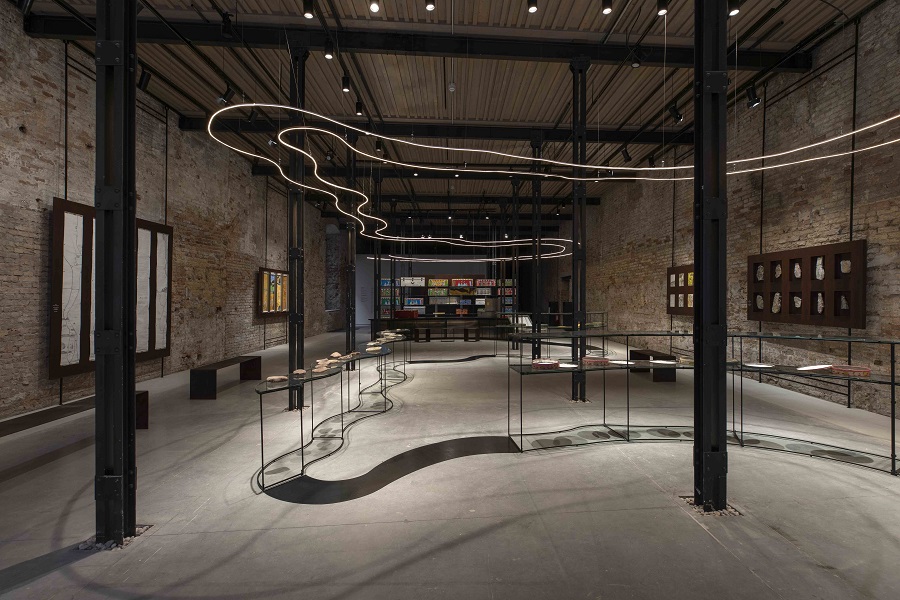
Qatar
While Qatar doesn’t have a national pavilion at the biennale, it is presenting “Your Ghosts Are Mine: Expanded Cinemas, Amplified Voices” — a group show of films by artists from across the Arab world, Africa and South Asia, as well as video installations from the collections of Mathaf: Arab Museum of Modern Art and the Art Mill Museum (scheduled to open in 2030). All the films were backed by the Doha Film Institute.
“For me, it was important to show movies reflective of the theme of the biennale — so, revolving around immigration, foreigners, personal diaries and self-portraits and stories from women — all coming from independent (artists) in the Global South, whose voices are not always shared,” the Paris-based curator Matthieu Orlean told Arab News.
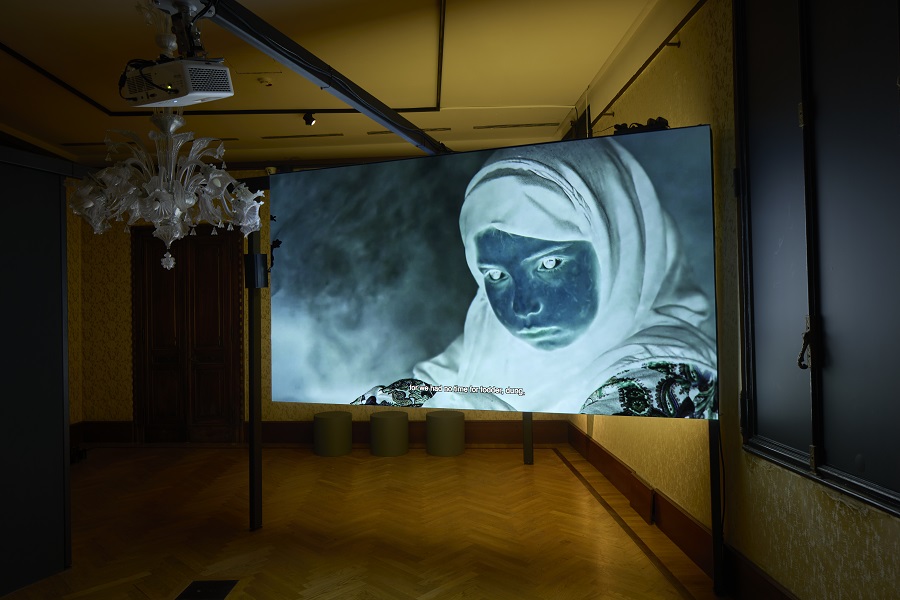
Egypt
Alexandrian-born artist Wael Shawky has created “Drama 1882,” a 45-minute film for which he also composed the music, for Egypt’s national pavilion, which — in the first week of the biennale at least — has proved to be one of the most popular pavilions at this year’s event.
The film is based around Egypt’s nationalist Urabi revolution against imperial influence in the late 19th century and Shawky uses historical and literary references as starting points from which to weave together a story that fuses fact, fiction and fable, while also exploring national, religious and artistic identity.
“I worked with performers who enacted a play in a theater for the film,” Shawky told Arab News. “The film strives in part to connect the idea of history to drama — drama regarding the connection to catastrophe and drama regarding cynicism. I like to analyze the authenticity of history, especially Egyptian history. When one makes films about history there is this gap between truth and myth.”

Lebanon
Lebanese artist Mounira Al-Solh’s multimedia installation “A Dance with Her Myth” combines drawing, painting, sculpture, embroidery, video, and audio, and guides viewers through ancient Phoenicia. The piece, Al-Solh explains to Arab News, is inspired by the tale of Europa, the daughter of a Phoenician king who was abducted from the city of Tyre in Lebanon by the Greek god Zeus, who had transformed himself into a white bull to trick her into riding him, then took her off into the sea.
“The (work) pays tribute to the ancient multicultural heritage of Lebanon,” Al-Solh says.
In the center of the pavilion is an unfinished boat, that Al-Solh says references “the tension that women still face today, despite their emancipation.”
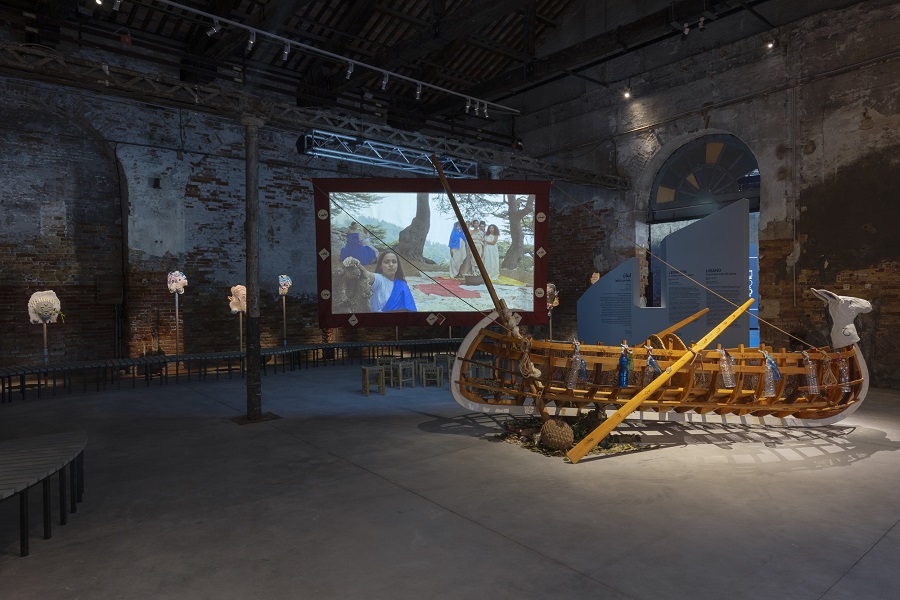
Oman
Oman’s second participation in the biennale, is an exhibition titled “Malath — Haven.” It includes work from five Omani contemporary artists: Ali Al-Jabri, Essa Al-Mufarji, Sarah Al-Aulaqi, Adham Al-Farsi and Alia Al-Farsi (who also curated the show). “We used the word ‘haven’ in the title because, since antiquity, foreigners — including the Romans, Portuguese and Indians — have visited Oman,” Alia Al-Farsi told Arab News. The works on display — from Al-Farsi’s own colorful and expressive mixed-media murals (such as “Alia’s Alleys,” pictured here) to Al-Aulaqi’s “Breaking Bread,” which includes a large sculpture of a niqab made from silver spoons — reflect both traditional and contemporary life in Oman.
“As an Omani creative with an international background, my aim was for the exhibition to serve as a sanctuary for visitors and travelers, allowing stories to unfold and intertwine, mirroring how our country finds its richness in intercultural dialogue,” the curator said in a statement.
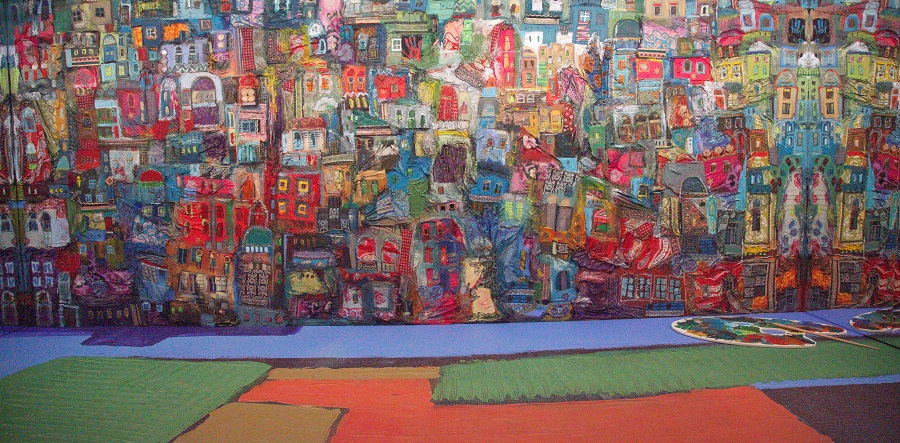
Arab-American Heritage Month: Sama Alshaibi — ‘I’m trying to change this idea of what an Arab woman is’
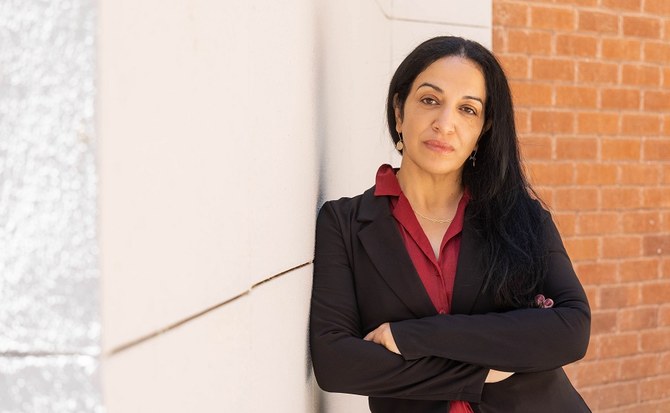
DUBAI: The fourth in this year’s series focusing on contemporary Arab-American artists in honor of Arab-American Heritage Month.
Born in Basrah to an Iraqi father and a Palestinian mother, Sama Alshaibi is an Arizona-based professor and artist who has mostly devoted her 20-year career to video, photography and performance art.
During the Iran-Iraq war of the Eighties, Alshaibi and her family moved around the region, living in Saudi Arabia, the UAE, and Jordan, before eventually settling in the American Midwest when she was 13 years old.
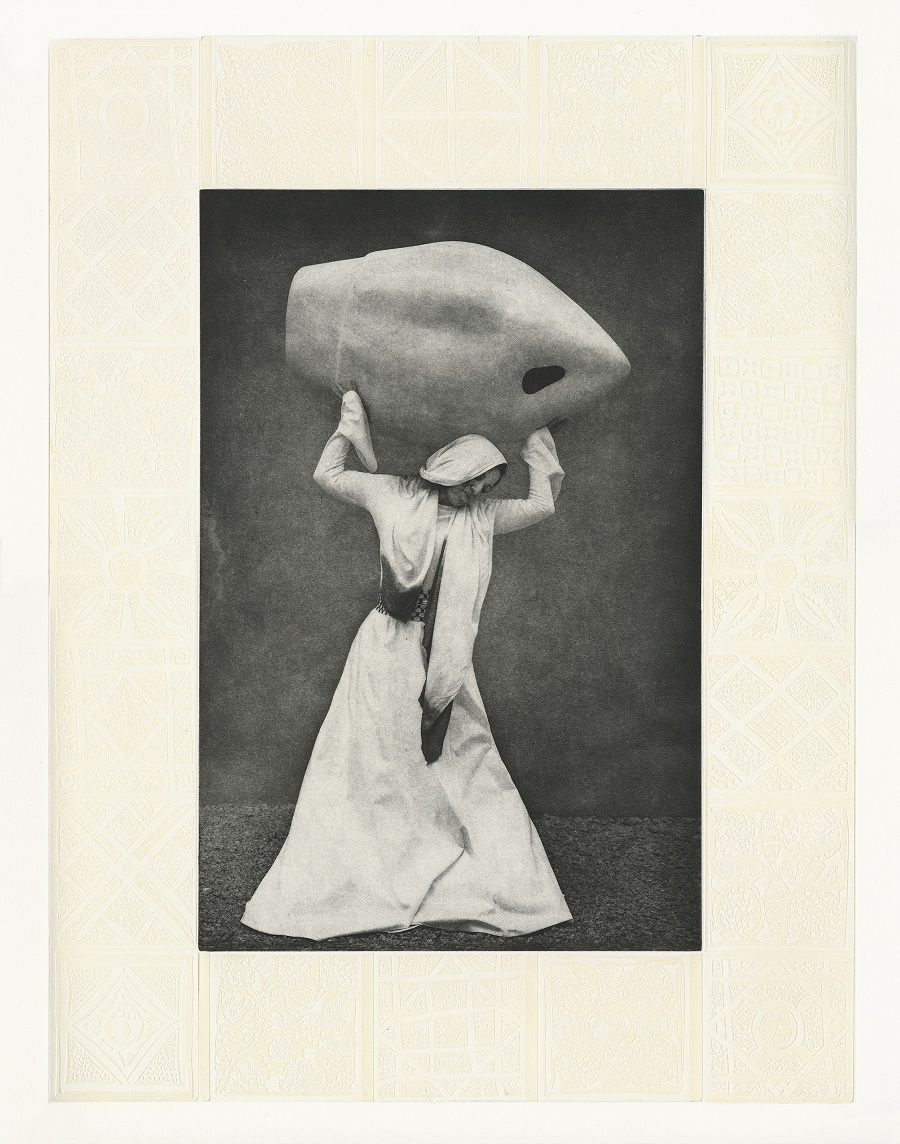
“Growing up in the United States was strange. We were a ‘different’ family in Iowa and there wasn’t a lot of diversity. But I grew up in a place with nice people,” Alshaibi tells Arab News from Bellagio, Italy, where she is doing a residency at the Rockefeller Foundation.
But she also says there were obstacles, mainly formed by major political events that impacted her. “It was challenging, because of where I’m from,” she says.
Alshaibi’s work is largely inspired by her Arab roots. “Arts were so revered in my family,” she says. “I don’t even know if I would be making art if it wasn’t for my heritage.” It was her father, an avid photographer, who taught her to use a manual camera. She aspired to become a photojournalist herself — inspired by 20th-century African-American photographers, notably Carrie Mae Weems and Lorna Simpson, who documented Black culture in their imagery.
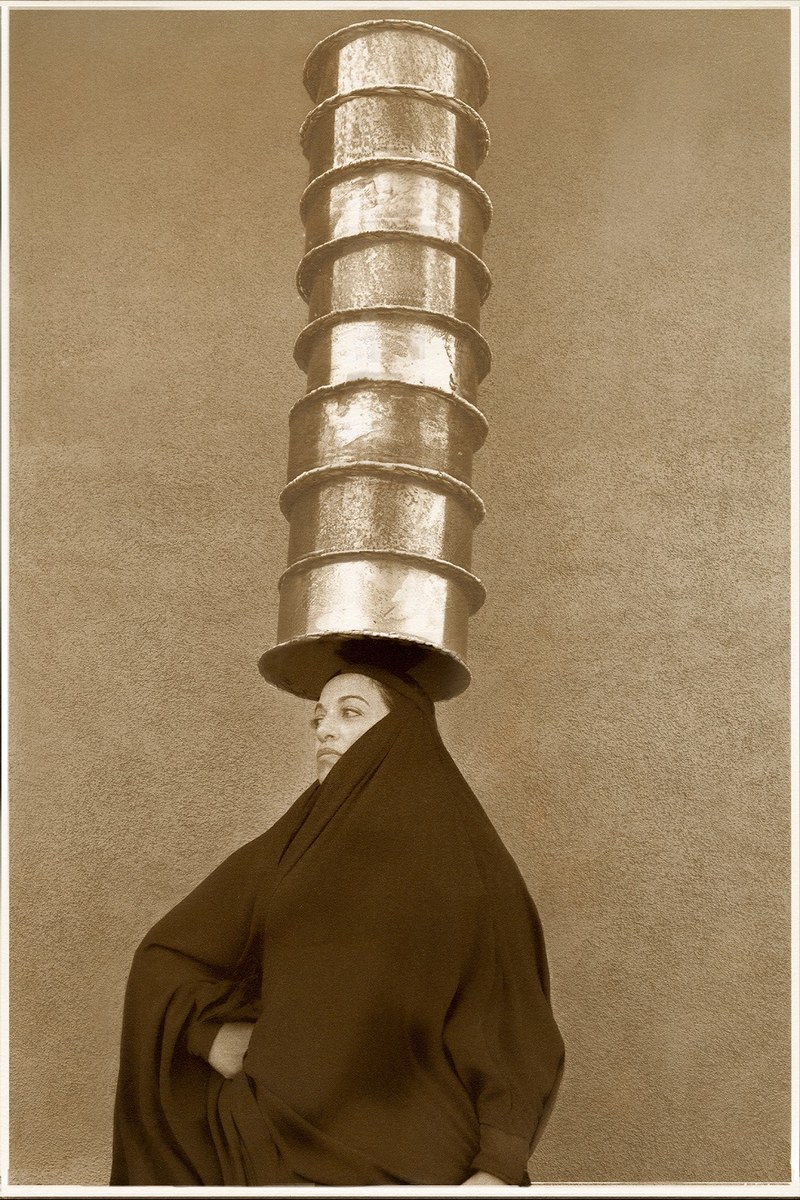
Many of her images are portraits of herself wearing, for example, traditional Middle Eastern garments, referencing romanticized Orientalist portrayals of women, and in the end, challenging them.
“I’m trying to change this idea of what you think an Arab woman is,” she explains. “I started seeing the power of communication, of taking political or social issues and using your body, your performance, your environment, to address them.”
One of Alshaibi’s best-known series is called “Carry Over,” in which she photographed herself carrying large objects (or Orientalist props), such as a tower of container tins or a water vessel, above her head. The images poetically show a woman’s endurance and comment on a collective history, affected by colonialism and cultural loss.
“I’ve always been interested in the notion of ‘aftermath’ — what happens after the destruction of your environment,” explains Alshaibi. “It gets you to the question of what we can’t hold onto anymore.”
REVIEW: ‘Returnal’ — a thoughtful and challenging sci-fi adventure
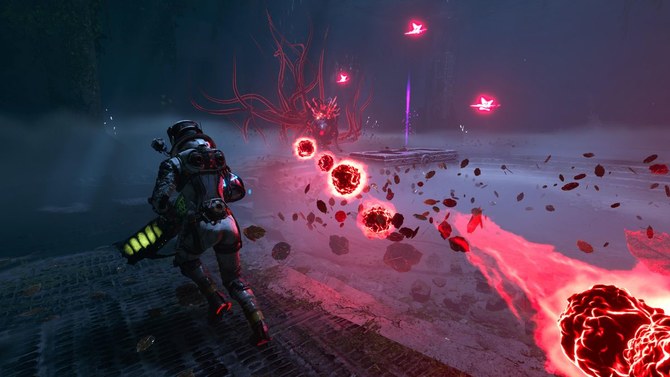
LONDON: Right from the start, before you even take control of Selene Vassos, a reconnaissance scout who has crash landed on a prohibited and mysterious planet, you are warned that “Returnal” (available originally for PS5 but now PC too) is “intended to be a challenging experience.” Such difficulty may deter the casual gamer used to a steady progression of character and exploration through a games environment. However, “Returnal” is a thoughtful and rewarding adventure that lays claim to much originality of thought in its set up. The key theme is that when you die, you return! But not to the same environment that you were in before. Instead, each new cycle postures new challenges and progress can only be made by unlocking upgrades that allow you to make more meta progress in Selene’s journey.
Selene herself is a super professional, unfazed character who doesn’t appear too bothered when she comes across a body of her former self that died in this strange world where the laws of physics and time appear not to apply. Staying alive is obviously crucial, particularly as it allows her to retain better weapons for longer. In addition, avoiding damage allows for boosts of agility, vision and more, making for a more lethal Selene. The environment is varied and surprising with each incarnation and the weapons on offer come complete with a range of exciting alternative fire mechanisms such as homing missiles or laser-like items. A hostile environment where even plants are a threat to life is mitigated by your technology, the core of which you can improve despite the reset of deaths, through fancy smart “xeno-tech” that becomes integrated with alien kit left around.
There is a paradox in “Returnal” described by Selene herself that she is trapped in an environment that is “always the same, always changing,” which literally makes no sense. Players have to be patient in the early chapters getting used to the sapping dynamic of death and return. Once that makes more sense, the loneliness of both her alien environment and the impossibility of even dying to escape it make for a pretty special atmosphere that a smart shooting engine then complements.









